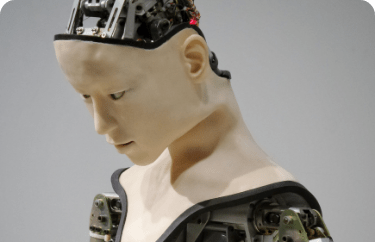5 Roles of Artificial Intelligence in Business Optimization
- michael
- May 4, 2023
Artificial intelligence (AI) has grown in importance as a tool for business optimisation, and
its influence on the corporate sector is only likely to rise in the future years. AI-powered
systems can quickly and correctly analyse massive amounts of data, discover trends, and
deliver insights that can help businesses optimise their operations, cut expenses, and
improve their decision-making capabilities. In this essay, we’ll go over the five roles that
AI can play in business optimisation
1. Predictive Analytics
One of the most powerful applications of AI in business optimisation is predictive
analytics. AI-powered systems can find patterns and correlations in enormous volumes of
historical data that people would be unable to recognise manually. This method is useful
for forecasting sales, client behaviour, and even equipment breakdowns. Businesses can
optimise their operations and improve their decision-making capabilities by forecasting the
likelihood of future occurrences based on past events.
A manufacturer, for example, can utilise predictive analytics to detect probable equipment
issues before they occur. AI-powered systems can spot patterns that may suggest an
approaching failure by analysing data from sensors embedded in the machinery. This can
assist the manufacturer in scheduling maintenance in advance, decreasing downtime and
lowering the chance of costly repairs.
2. Intelligent Automation
For many years, businesses have employed automation to reduce costs and improve
efficiency. However, with the introduction of AI, automation has grown much more
powerful. Artificial intelligence-powered systems can analyse data in real time, find trends,
and make decisions without the need for human participation.
A customer service department, for example, can deploy AI-powered chatbots to answer
typical consumer enquiries. The chatbot may respond without human interaction by
analysing the customer’s message and using natural language processing techniques. This
can save time and money on manual customer support while also improving the customer
experience and freeing up workers to focus on more complicated issues
3. Personalization
As clients seek more personalised experiences, personalization is becoming increasingly
crucial in the business world. Customer data, such as purchase history and browsing
behaviour, can be analysed by AI-powered systems to discover preferences and deliver
personalised recommendations.
A fashion retailer, for example, can employ AI-powered recommendation engines to select
clothes that a consumer is likely to be interested in based on their browsing and purchase
history. The retailer can raise the likelihood of a purchase and promote consumer loyalty
by personalising the shopping experience.
4. Fraud Detection
Fraud is a major issue for organisations, especially in industries such as finance and
insurance. Artificial intelligence-powered systems can aid in the detection of fraud by
analysing massive amounts of data and discovering trends that may suggest fraudulent
behaviour.
An insurance business, for example, can employ AI-powered fraud detection systems to
analyse claims data and find trends that could indicate fraudulent conduct, such as several
claims for the same ailment. This can assist the organisation in detecting and preventing
fraud before it occurs, hence minimising the financial impact on the business.
5. Assistance in Making Decisions
Every day, businesses make thousands of decisions, ranging from strategic ones like
entering new markets to operational decisions like employee scheduling. AI-powered
solutions can assist firms in making better informed decisions by analysing data and
delivering insights.
A shop, for example, may employ AI-powered tools to optimise their pricing approach.
The technology can determine the best pricing point for each product by analysing data
such as rival prices, customer behaviour, and market trends. This can assist the retailer in
increasing sales and maximising earnings.
Conclusion
AI is rapidly changing the way businesses function, giving insights and automating jobs
that humans would be unable to complete manually. Businesses may optimise their
operations, cut expenses, and improve their decision-making capabilities by embracing the
power of AI. Predictive analytics, intelligent automation, customization, fraud detection,
and decision support are just a few of the various roles that AI may play in optimising
business operations. As AI technology advances, its potential for business optimisation will
only grow.
It is critical to understand that AI is not a substitute for human intelligence or expertise. It
is, rather, a tool that may assist humans in making better judgements and optimising their
operations. Businesses who embrace artificial intelligence and invest in the technology are
likely to have a competitive advantage over those that do not.
However, putting AI into practise is not always simple. It necessitates substantial
investments in both technology and talent. Businesses must have a clear knowledge of their
objectives and how AI might assist them accomplish those objectives. They must also
implement a good data strategy, as AI relies on high-quality data to give correct insights.
Furthermore, enterprises must ensure that AI is used ethically and responsibly. AI-powered
systems can make life-changing decisions, so it’s critical to guarantee that those judgements
are fair and unbiased.
To summarise, artificial intelligence is revolutionising the way businesses run and giving
a strong tool for business optimisation. AI-powered systems can provide insights and
automate operations that people would be unable to execute manually, ranging from
predictive analytics to intelligent automation. Businesses may optimise their operations,
cut expenses, and improve their decision-making capabilities by embracing the power of
AI. However, integrating AI necessitates careful preparation and investment, and
companies must ensure that the technology is used ethically and responsibly. As AI
technology advances, its potential for business optimisation will only grow.

Robotic Process Automation
Blog Categories
Feel free to get in touch with our experts.
Other articles
Emerging Chatbot Trends: AI Technology, NLP, Sentiment Analysis & Multi-Language Support for Customer Support
Enhancing healthcare through intelligent conversation. Enhancing Mental Health Support and...
Read MoreHow to Get Started with AI and RPA
Introduction to AI and RPA: A Beginner’s Guide Artificial Intelligence...
Read MoreAI and RPA for Customer Service
The Impact of AI and RPA on Customer Service: Enhancing...
Read More


